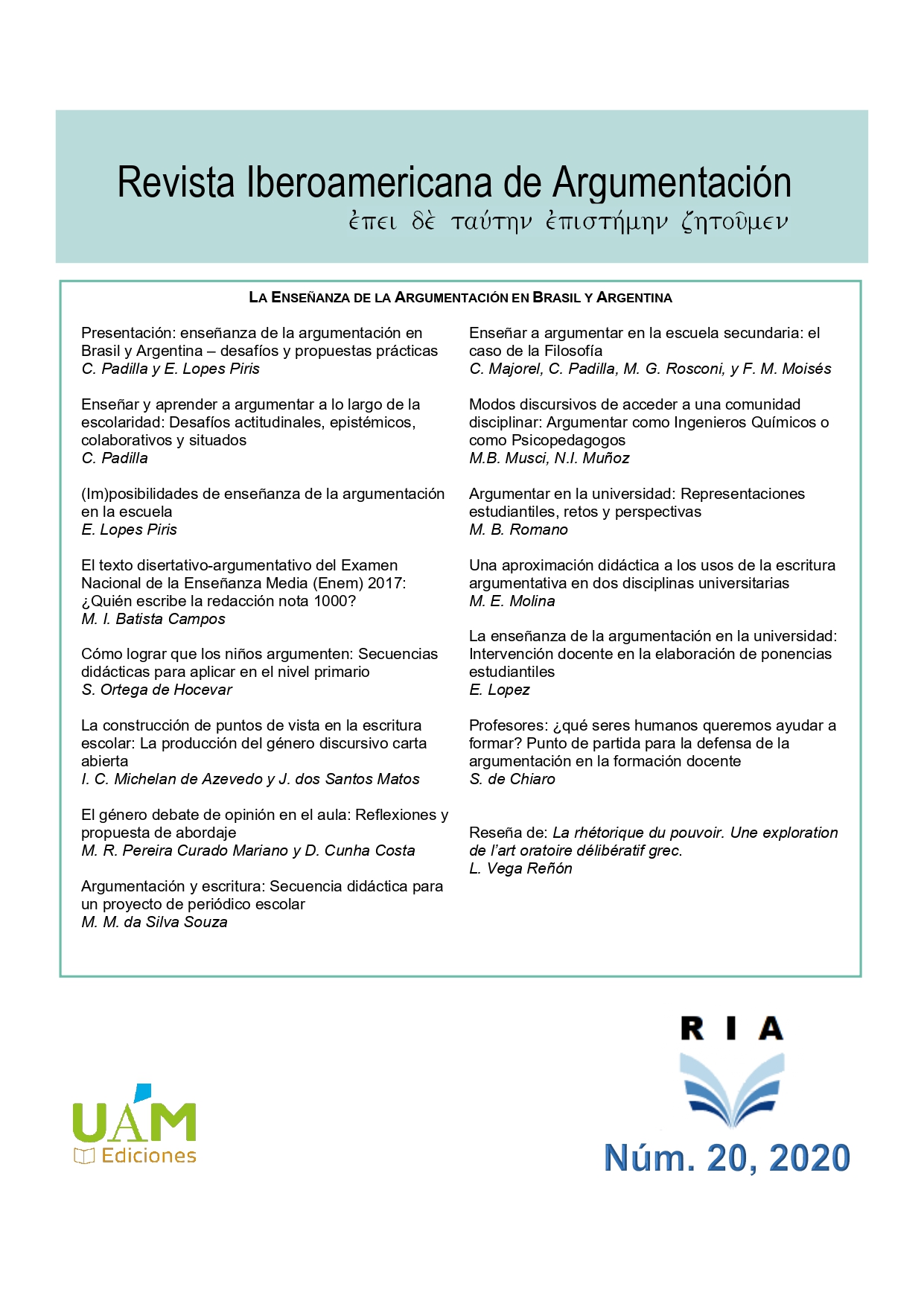Profesores: ¿qué seres humanos queremos ayudar a formar? : Punto de partida para la defensa de la argumentación en la formación docente
Mots-clés :
enseñanza de la argumentación, formación del profesorado, metacognición, pensamiento crítico-reflexivo, práctica pedagógicaRésumé
El presente texto parte de la preocupación por la formación de ciudadanos crítico-reflexivos, quienes pertenecen a un mundo complejo que les exige posicionarse continuamente ante diversos dilemas. Entendemos que, si un educador se siente contagiado de esta preocupación, la planificación de prácticas pedagógicas que favorezcan una construcción de conocimiento igualmente crítica y reflexiva será parte de sus preocupaciones. La argumentación en educación se ha propuesto como un camino interesante en este sentido, impactando directamente en la reflexión sobre la formación docente. Específicamente, este artículo propone pensar la argumentación en entornos educativos, especialmente en cursos de formación de docentes, desde dos dimensiones: argumentar para aprender y aprender a argumentar. Por lo tanto, además de las reflexiones sobre el potencial del discurso argumentativo para una construcción crítica y significativa del conocimiento, basado en un funcionamiento reflexivo, metacognitivo y autorregulador, también encontramos propuestas prácticas asequibles para incluir la argumentación en la formación docente.
Téléchargements
Références
Baker, M. (2009). “Argumentative interactions and the social construction of knowledge”. En: N. Muller Mirza; A-N. Perret-Clermont (Eds.). Argumentation and education: theoretical foundations and practices (pp. 127-144), Dordrecht: Springer.
De Chiaro, S. e Leitão, S. (2005). “O papel do professor na construção discursiva da argumentação em sala de aula”. Psicologia: Reflexão e Crítica 18/3, 350-357.
De Chiaro, S. (2006). Argumentação em sala de aula: um caminho para o desenvolvimento da autorregulação do pensamento, 2006, 193f. Tese de Doutorado – Curso de Pós-Graduação em Psicologia Cognitiva, Universidade Federal de Pernambuco, Recife, PE.
De Chiaro, S. e Aquino, K. A. Da S. (2017). “Argumentação na sala de aula e seu potencial metacognitivo como caminho para um enfoque CTS no ensino de química: uma proposta analítica”. Educação e Pesquisa, 43/2, 411-426.
Eemeren, F. H. van, Grootendorst, R. and Henkemans, F. S. (1996). Fundamentals of argumentation theory. New Jersey: Lawrence Erlbaum Associates.
Fuentes, C. (2011). “Elementos para o desenho de um modelo de debate crítico na escola”. En: S. Leitão e M. C. Damianovic (Eds.). Argumentação na escola: o conhecimento em construção (pp. 225-249). Campinas: Pontes Editora.
Govier, T. (2001). A Practical Study of Argument. Belmont: Wadsworth.
Higgins, S. (2013). “Self regulation and learning: evidence from meta-analysis and from classrooms”. En: D. Whitebread, N. Mercer, C, Howe and A. Tolmie (Eds.). Self-regulation and dialogue in primary classrooms. British Journal of Psychology ‘Current Trends’ Monograph Series (pp. 111-126). Leicester: British Psychology Society.
Howe, C. and Abedin, M. (2013). “Classroom dialogue: a systematic review across four decades of research”. Cambridge Journal of Education 43/3, 325-356.
Jimenez-Aleixandre, M. P. e Brocos, P. (2015). “Desafios metodológicos na pesquisa da argumentação em ensino de ciencias”. Revista Ensaio 17,139-159.
Kuhn, D. (1992). “Thinking as argument”. Harvard Educational Review 62,155-178.
- (2005). Education and thinking. Cambridge: Cambridge University Press.
Leitão, S. (2007). “Processos de construção do conhecimento: a argumentação em foco”. Pró-Posições 18/3, 75-92.
- (2011). “O lugar da argumentação na construção do conhecimento em sala de aula”. En: S. Leitão e M. C. Damianovic (Eds.). Argumentação na escola: o conhecimento em construção (pp. 13-46), Campinas: Pontes Editora,.
Leitão, S.; De Chiaro, S. y Ortiz, M. I. C. (2016). “El debate crítico: un recurso de construcción del conocimiento en el aula”. Textos de didáctica de la lengua y la literatura 73, 26-33.
Mercer, N. (2013). “Classroom talk and the developmente of self-regulation and metacognition”. En: D. Whitebread, N. Mercer, C, Howe and A. Tolmie (Eds.) Self-regulation and dialogue in primary classrooms. British Journal of Psychology ‘Current Trends’ Monograph Series (pp. 1-23.). Leicester: British Psychology Society,
Mercer, N. and Howe, C. (2012). “Explaining the dialogue processes of teaching and learning: the value of socioalcultural theory”. Learning, Culture and Social Interaction 1/1, 12-21.
Miller, R. (2011). Vygotsky in Perspective. Cambridge: Cambridge University Press.
Perry, N. (2013). “Understanding classroom processes that support children’s self-regulation of learning”. En: D. Whitebread, N. Mercer, C, Howe and A. Tolmie (Eds.) Self-regulation and dialogue in primary classrooms. British Journal of Psychology ‘Current Trends’ Monograph Series (pp. 45-68), Leicester: British Psychology Society.
Sasseron, L. H. e Carvalho, A. M. P. (2013). “Ações e indicadores da construção do argumento em aulas de ciencias”. Revista Ensaio 15/2,169-189.
Schwarz, B. (2009). “Argumentation and learning”. En: N. M. Mirza and A-N Perret-Crelmont (Eds.). Argumentation and education: theoretical foundations and practices (pp. 91-126), Dordrecht: Springer.
Sinclair, J. McH. and Coultard, M. (1975). Towards an analysis of discourse: The English used by pupils and teachers. Oxford: Oxford University Press.
Vygotsky, L. S. (1987). Pensamento e Linguagem. São Paulo: Martins Fontes.
- (2000). A Formação Social da Mente. São Paulo: Martins Fontes.
- (2001). Mind in society: The development of higher psychological processes. Cambridge, MA: Harvard University Press.
